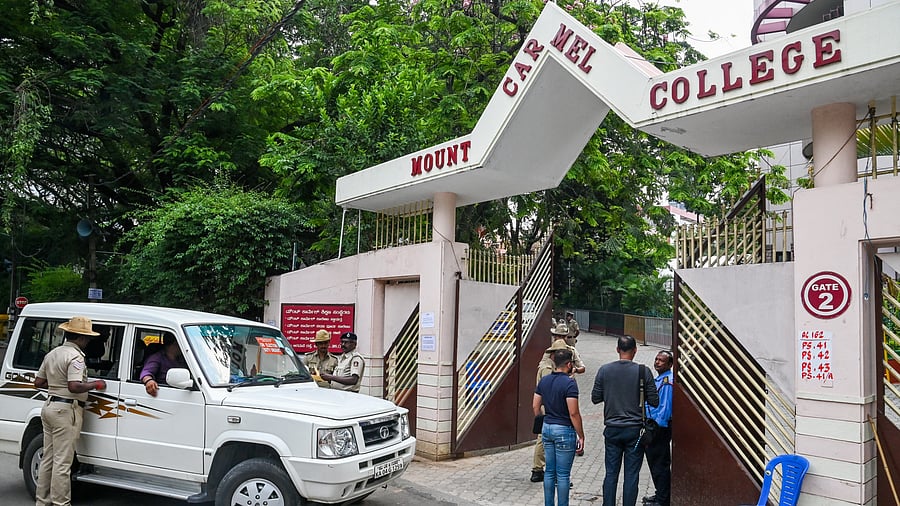
Faculty and administrators across city institutions are divided on the need for dress codes, such as the one implemented at Mount Carmel College.
Credit: DH File Photo
A campaign opposing Mount Carmel College’s student dress code has sparked debate over whether the rules amount to moral policing and curtailment of freedom of expression.
The campaign was shared on the Instagram page of Collective Bangalore. While it claims the dress code is “new”, the college principal previously told DH that it has long been in place. The rules ban flip-flops, cargo pants, coloured hair, and round or V-neck T-shirts, and require boys to keep their hair groomed. The campaign also highlights restricted movement on campus and the cancellation of student elections as part of the new policies.
Three students from the college told Metrolife they have faced uncomfortable checks at the campus gate. A first-year female student said she and her friends are often “pulled up for wearing printed tees”. She recalled being sent home once for wearing pants with pockets, and on another occasion, for wearing a sleeveless blouse, even though she had a shirt over it.
Once an all-girls institution, the college now admits male students. Commenting on the dress code, a first-year male student said such rules create “unwanted fear among girls and make them feel unsafe around boys”. He also finds the norms arbitrary, and adds, “I have long hair but am constantly told to cut it.”
‘A necessity’
Faculty and administrators across institutions remain divided on the need for dress codes.
Joshua Samuel, principal of Baldwin Methodist College, said his institution has had a dress code for over a decade, and students generally comply without complaint. BBA and BCA students wear uniforms, while others are expected to dress “well”. “Torn jeans or attire with skulls or profane language (printed on them) is not allowed,” he said. The aim, he explained, is to promote decency and equality, not to police fashion.
Y C Kamala, associate professor with Government First Grade College, Malleswaram, described a dress code as a “necessity” during college hours. “Between 10 am and 5 pm, the focus should be on learning,” she reasoned. While acknowledging that “decency” is subjective, she believes not all students between the ages of 19 and 21 approach clothing choices with maturity. “In a truly mature society, dress codes wouldn’t matter. But at this age, some boundaries help,” she said. Kamala emphasised that such rules should be communicated at the time of admission, allowing students to make an informed decision about whether they want to join the college.
Venugopal K R, former principal of University Visvesvaraya College of Engineering, supports dress codes, especially uniforms. “They reduce disparities between rich and poor. In private colleges, fashionable and expensive clothes often reflect status,” he said. He described decency as an exercise in moderation, arguing that “like lab overalls, moderate attire in classrooms promotes focus and discipline”.
‘Don’t impose unilaterally’
S Japhet, former vice-chancellor of Bengaluru Central University, opposes dress codes in principle, particularly in women’s colleges. “Dress is a form of self-expression. To restrict it in the name of ‘decency’ is problematic because ideas of decency are subjective,” he said.
While he agrees that a basic code can help reduce visible economic differences, he argued that dress codes should not be imposed unilaterally. “Any decision on dress codes should be made democratically, in consultation with students, parents, and even alumni. Otherwise, it becomes moral policing,” he noted. Japhet also warned that rigid restrictions, such as those seen during the hijab ban controversy, risk infringement of fundamental freedoms.
A journalism professor said that codes of conduct should prioritise justice and safety, not attire. “Most rules, based on vague ideas of ‘decency’, become tools for micromanagement,” she said. Over-policing, she added, breeds mistrust among students.
Rolla Das, assistant professor at a private university, echoed this view. “What started as a way to ensure uniformity and professionalism now often serves as a tool for surveillance and control, enforcing veiled patriarchy, particularly affecting marginalised groups like religious and gender minorities.”
Arbitrary dress codes, she argued, “undermine the core values of higher education: inclusivity, equity, and creative expression.”